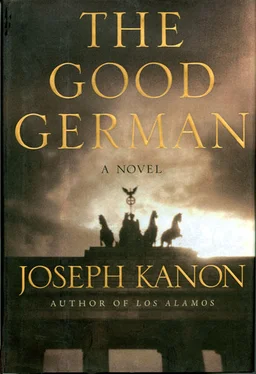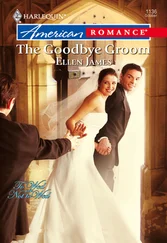“No, I didn’t think that.” He looked away. “Anyway, there wasn’t. I don’t know what the hell Brandt meant, if he meant anything. The important thing is what wasn’t there. These guys are clean.”
“Teitel doesn’t think they’re so clean.”
“He’s a Jew. What do you expect?”
Jake looked over at him. “Maybe not to hear an American say that,” he said quietly.
“You know what I mean. The guy’s on a fucking crusade. Well, he’s not getting these guys. There’s nothing there.”
Jake stood up. “There must be. Something Tully figured he could sell to the Russians.”
“Well, not that they were Nazis. The Russians don’t care.”
“And neither do we.”
Shaeffer raised his head, poster-boy chin out. “Not these guys.”
Outside, the light had begun to fade, the lingering soft end of the day. In the billet they’d be getting ready for dinner, the old woman ladling soup. Jake left the jeep and walked down Gelferstrasse, thinking of that first evening when Liz had flirted with him in the bath. About the time Tully must have been reading files, waiting for someone. Or had he been surprised? Start the numbers over. Tully arriving at the airport. Somewhere in the blur of Liz’s pictures, unless they were just another empty file too.
The old man was setting the table as he passed by the dining room avoiding the drinks crowd in the lounge. Upstairs, his room had been dusted and aired, the pink chenille spread stretched tight. Maid service. Liz’s photographs were stacked neatly on the vanity table, just as he’d left them, in no particular order. The wrecked plane in the Tiergarten, some DPs off in the corner. Churchill. The boys from Missouri. Another, but not a duplicate, the pose slightly shifted. Liz was like all the photographers he’d known-snap lots of pictures and pretend the good one was the only one you’d taken, a random art. One he’d missed before, him looking at the rubble in Pariserstrasse, shoulders slumped, his face slack with disappointment. In a magazine, without a caption, he might have been a returning soldier. He glanced up at his real face in the mirror. Somebody else.
The airport. He pulled the glossy out of the pile and studied it, moving his eyes slowly over the picture as if he were developing it, trying to sharpen figures in the blur. The effect, oddly, was like looking at the shot in Pariserstrasse, a scene out of context. Had he really been there? A second of time he’d missed. Ron standing at the center with his cocky grin, the Tempelhof crowd swirling behind him. The back of a head that might be Brian Stanley’s, the bald spot catching the light. A French soldier with a pompom hat. Nothing. He picked up the next photograph, almost the same but angled, Liz having moved farther left. If you flipped from one to the other, the figures moved, like old posture pictures. Off to the right, a small gleam. Polished boots? He brought the photograph close to his face, fuzzier, then held it out again. Maybe boots, the right height, but the face was indistinct. He flipped them again, but the gleam didn’t move. If it had been Tully, he’d been standing still, his side to the camera, looking left.
The knock was no more than a polite tap, scarcely audible. Jake swiveled to see the old man’s head poking around the door.
“Excuse me, Herr Geismar. I don’t mean to disturb you.”
“What is it?”
For a second the old man just looked, blinking, and Jake wondered if he was seeing his daughter again in her usual seat, dusty with powder.
“Herr Erlich said to ask you about the basement room. The photographic equipment? It’s not to hurry you, but you understand, we need the room. When it’s convenient.”
“I’m sorry. I forgot. I’ll clean it out right away.”
“When it’s convenient,” he said, backing out.
Jake followed him down the stairs and was almost at the basement door when Ron came out of the lounge, glass in hand. “I thought I saw you slinking around. Dining in tonight?” The same grin, as if he were still in the photograph.
“Can’t. I’m just clearing out Liz’s things. Where should I send them?“
“I don’t know. Press camp, I guess. Listen, don’t run away, I’ve got something for you.” He took a folded paper from his pocket. “Don’t ask me why, but they okayed it. She requested it, they said. There something between you two I don’t know about? Anyway, you’re in. Just show them this.” He held out the paper. “Don’t forget, you don’t own this one. Everybody gets a piece of this.”
“A piece of what?”
“The interview. Renate Naumann. The one you asked for, remember? Christ, here I’m turning cartwheels for the Soviets and you could care less. Typical.”
“She asked to see me?”
“Maybe she thought you’d catch her good side. I wouldn’t wait on this, by the way. The Russians change their minds every five minutes. Besides, you could use the story. The natives are getting restless.” He pulled a telegram from the same pocket and held it up.
“You’ve read it?”
“Had to. Regulations.”
“And?”
“‘Great mail response hero story,’” he quoted without opening it. “‘Send new copy ASAP. Friday latest.’” He tapped Jake’s chest with both papers. “Saved by the bell, hero. You owe me one.”
“Yeah,” Jake said, taking them. “Put it on my bill.”
Liz’s darkroom was a small, musty enclosure near the coal bin, with deep wooden crates in one corner for root vegetables. A table with three trays for solutions under a dangling light fixed with her portable red bulb. A few tins of developer and some prints hanging from a string like laundry. A box of matte paper. Why not let the old couple have it all? It was bound to be worth something in the market. But who took photographs these days? Were there weddings anymore in Berlin?
Liz, at any rate, had taken a lot. The table was littered with contact sheets, the loose pile held down by a heavy magnifying glass, the kind librarians use to read small type. Jake looked through it, and the postage-stamp frames zoomed up to life size. Powerful enough to see if a gleam was coming off boots. He put it in his pocket, then stacked the rest of the equipment at one end of the table. Against the wall there was a side table with another set of prints. He flipped through. The same pictures he’d seen upstairs, but different shots, not quite as sharp-discards, the ones no editor would ever see. The Chancellery. The airport again, Ron still grinning, but the background even less clear. It was when he held it up to the dim light, looking for boots, that his eye caught the dull shine of the gun hanging on the wall.
He put down the print, reached for the holster, and brought it over to the light. A Colt 1911. But everyone had one-standard issue. He took it out, surprised at its weight. The gun she should have been wearing in Potsdam. Three of them in the market. He stared at it for a minute, reluctant even now to let his mind follow the thought through. Had it been fired? They could match the bullet, the carbon firing marks as distinctive as fingerprints. But this was crazy. He opened the gun. An empty chamber. He lifted it to his nose. Only a hint of old grease, but what had he been expecting? Did the smell of firing hang in the chamber like ash, or did it drift away? But no bullets. Not even loaded, a showpiece to keep the wolves away. So much for Frau Hinkel, surrounding him with deception. He dropped the gun onto the prints, then scooped up the pile with both hands and carried it all back upstairs.
The magnifying glass was small, but it did the trick-the background still wasn’t sharp, but at least the blurs took shape. Uniforms passing in front of other uniforms. Definitely boots. He followed the line up-an American uniform, a face that might have been Tully’s, had to be, anchored by the boots. So Liz had caught him after all. But so what? There was nothing he hadn’t known before. Tully had arrived and now stood looking left at something. Jake moved the glass across the picture. But there was only the back of Brian’s head, the same uniforms as before, none of them looking toward Tully, and then the white edge.
Читать дальше












